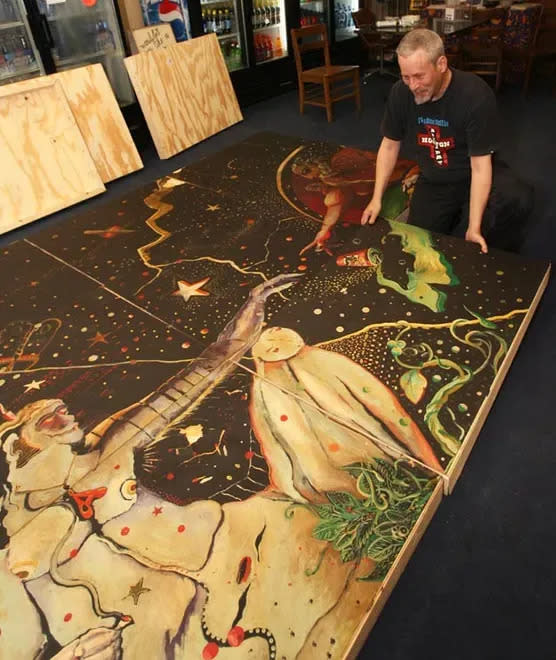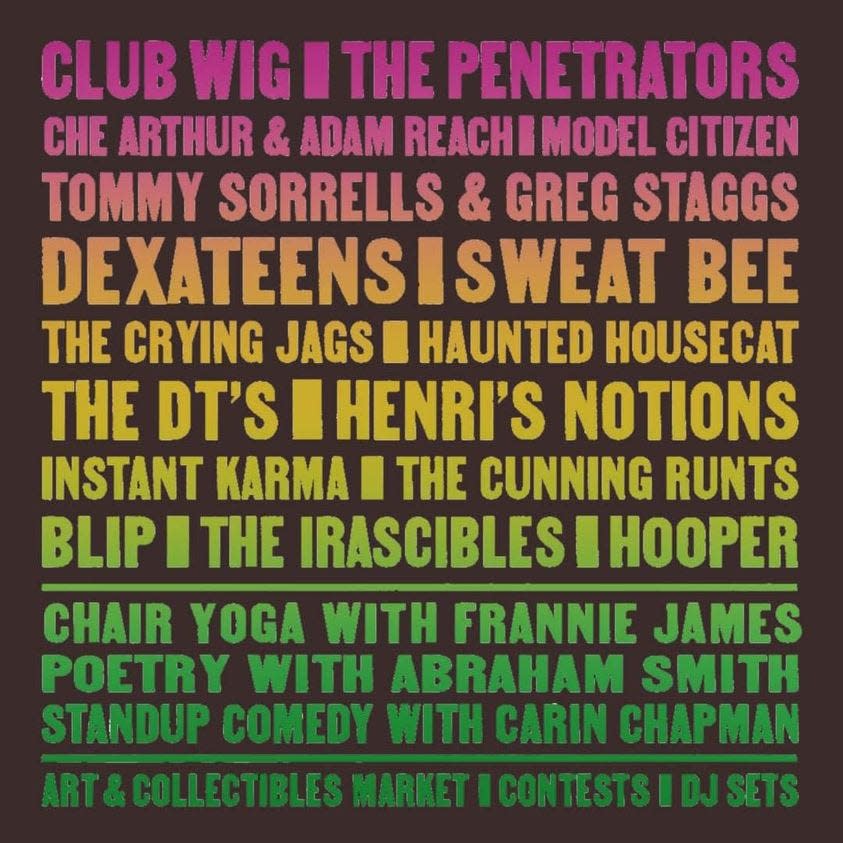Eras are rarely what we remember; only what we bring into the present | MARK HUGHES COBB
- Oops!Something went wrong.Please try again later.
“ 'I personally recall that world, which you can only imagine was preferable to this one,' she said. 'Eras are conveniences, particularly for those who never experienced them. We carve history from totalities beyond our grasp. Bolt labels on the result. Handles. Then speak of the handles as though they were things in themselves.' "― William Gibson, from "The Peripheral"
There's a feeling not homesickness, nor nostalgia, but longing for a place you've never been. The German word's Fernweh, meaning farsickness. It's a yearning tied to dissatisfaction with self, a wish to sideslip into an alternative universe where decisions made better sense, rather than some remembered time. Anyone suffering anxiety and depression, or simply feeling Paul Westerberg's cry "Look me in the eyes/then tell me/that I'm satisfied," could be diagnosed with farsickness.
Friday and Saturday's Chukker Weekender may treat fernweh victims. As the bar shuttered literally 20 years ago, some of the folks planning to attend Druid City Brewing Co.'s two-day festival were either not yet born, or too young, to have experienced the real thing.
More: Monsters are real; in fiction, fantasy and film is how we deal | MARK HUGHES COBB
For those of us who did hang, the joke about the '70s comes to mind: "If you can remember it, you weren't there."
It was, until collapse Halloween 2003, the city's oldest bar (and probably the state's longest-continuous, in one space). That gay/biker/hippie/art/music/poetry/PBR bar. Walls crawling with scattered murals and graffiti-style exhortations, prominent among them Bob Weston's opening-side-length jungle, woven with mythic figures drawn literally from life, using Chukkerians as models. Other paint faded into pastel on porous walls, growing fuzzy and indistinct like an old Polaroid.
Its paired high-ceilinged rooms ― It opened in 1956 with just the single side — funneled back toward the bar, over which reigned Tom Bradford's bar-tab-payoff 16-panel psychedelic "The Re-creation of Man," riffing on Michelangelo, and commonly known as "The Sistine Chukker."

Past sometimes-working bathrooms, where hopeful bands would stencil names over the walls, which lead inevitably to someone writing the word "sucks" underneath, lay a textured courtyard of various aromas, from things smoldering and baked, and in darker corners hints that alley cats, or incontinent patrons, didn't stand in line. Sucks.
Back down that added second side, past dartboards, tables and chairs, the paint urged toward a stage over which hung a black silk parachute, intended to help dampen the sound, improve the old hall's acoustics. It's there where most of this weekend's re-assembled bands played. Back in the day.
You played on that stage, you felt for real, whether it was true or not. Bands could develop sound, build a following, hone chops, and then, encouraged, go record. Tuscaloosa never approached the heights of other music-incubator college towns such as Athens, Georgia, which helped birth REM, the B-52s, Drive-by Truckers, Widespread Panic and Pylon, or developed a reputation like that of Austin, Texas for being music-friendly, with its droves of venues, and its Austin City Limits and South by Southwest gatherings, launching pad for Janis Joplin, Gary Clark Jr., Asleep at the Wheel, Alejandro Escovedo, Lucinda Williams, Stevie Ray Vaughan and Willie Nelson.
But The Chukker, with its lush-atop-rough visual charm, its beckoning darknesses, grew into a musician's oasis in an otherwise sparse and unforgiving landscape echoing with "Play something we know!"
My response, though it usually fell on tin ears: Know something we play.

Part of a thing I wrote in 2003, as the city's demolition intentions closed in:
"Although now painted black, walls withdrawing from the stage used to be coated in graffiti-like psychedelia -- knights, dancing girls, freaks, geeks, queens ― as if an old-time Saturday night was hit by a smart bomb that plastered the crowd into living-color wallpaper.
"And The Chukker began to exceed the walls themselves, as the spirit outgrew the building."
For those of the earlier Chukker Nation, as its loved ones became known, those descriptions derive from another place, another era. Many recall fewer distractions, less chaotic sprawl, more intellectually curious folks just hanging, drinking beer ― that's all the alcohol the early Chukker could sell ― and talking, talking, talking.
More: Remembering the Chukker, an eccentric third place, 20 years gone | MARK HUGHES COBB
Numerous journalists wrote elegies and eulogies, in 2003, about the bar just a stone's throw from the old Tuscaloosa News building at 2001 Sixth St.
Features editor Jane Self wrote about: "… the night of Aug. 8, 1974 - the night Nixon gave his resignation speech. There was a lot of analyzing, debating and celebrating going on that night. And maybe a little raucous behavior."
Writer and columnist Tommy Stevenson recalled seeing the ratty-looking facade emblazoned with a homemade The Chukker sign, and ranks of Harley choppers parked out front:
" 'Boy,' I thought to myself, 'that looks like a door I'd never open.' "
But proximity, and garrulous allure, drew him in. "Other than the beer, the main attraction was the conversation, and rarely did a night pass that the big old round table in the middle of the main room wasn't alive with spirited banter from an assortment of eccentrics, including blue-collar workers, students, professors, bikers, gays, itinerant musicians, lawyers and the odd journalist or two. ...."
Even then eras would clash, and some would complain it ain't what it used to be, blah blah blah good old days. Tommy would turn to current habitues and say, "Hey, you too can come back in 15 years and fuss."
Until they couldn't.
Managing editor and editorial page editor Ben Windham: "Technically, The Chukker was a bar — a seedy-looking, dive bar, at that — but it also served as a restaurant, a meeting place, a melting pot, a music paradise, a romantic rendezvous; and to believers, sacred ground."
Whatever it was or might be, you can't deny the spirit, shown in concerted, months-long efforts of Matt Patton, Bo Hicks, Frannie James, Craig Gates, Rich Marcks, Jeremy Butler, Lori Watts and numerous others, to relight this creative fire, albeit at the Druid City Brewing Co.
Come and experience, but maybe tamp down the nostalgia, and think: These are the days.
Mark Hughes Cobb is the editor of Tusk. Reach him at mark.cobb@tuscaloosanews.com.
This article originally appeared on The Tuscaloosa News: When celebrating eras, remember: These are the days | MARK HUGHES COBB

